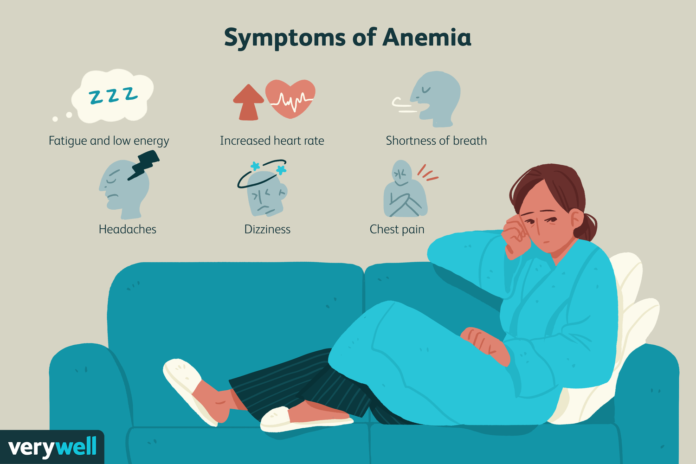Anemia is a condition in which the body doesn’t have enough red blood cells or hemoglobin, a protein found in red blood cells that carries oxygen to the body’s tissues. There are many different types of anemia, including:
1. Iron-deficiency anemia: This is the most common type of anemia, caused by a lack of iron in the body. Iron is needed to produce hemoglobin.
2. Vitamin-deficiency anemia: This type of anemia is caused by a lack of certain vitamins in the body, such as vitamin B12 or folic acid.
3. Hemolytic anemia: This is a rare condition in which red blood cells are destroyed faster than they can be produced.
4. Sickle cell: anemia: This is a genetic condition in which red blood cells are misshapen and break down easily, leading to a shortage of red blood cells.
5. Aplastic anemia: This is a rare condition in which the bone marrow doesn’t produce enough new blood cells.
6. Thalassemia: This is an inherited blood disorder in which the body doesn’t produce enough of certain types of hemoglobin.
Symptoms of anemia can include fatigue, weakness, pale skin, shortness of breath, headache, dizziness, rapid heartbeat, cold hands and feet, chest pain, and cognitive problems. Treatment for anemia depends on the underlying cause and may include iron or vitamin supplements, blood transfusions, medications, or other medical interventions. In some cases, lifestyle changes such as a balanced diet, regular exercise, and managing underlying health conditions can also improve anemia.
If left untreated, anemia can lead to serious complications, such as heart problems, increased risk of infections, pregnancy complications, and delayed growth and development in children. Therefore, it’s important to see a doctor if you experience symptoms of anemia or have a family history of the condition.
Anemia Treatment
Your treatment will depend on your type of anemia.
1_ If you have aplastic anemia, you might need medication, blood transfusions (in which you get blood from another person), or a bone marrow transplant (in which you get a donor’s stem cells).
2_ If you have hemolytic anemia, you might need medication that will hold back your immune system. Your primary care doctor may refer you to a doctor who specializes in vascular problems.
3_ If it’s caused by blood loss, you might have surgery to find and fix the bleeding. If you have iron-deficiency anemia, you’ll probably need to take iron supplements and change your diet.
4_ Sickle cell anemia treatment includes painkillers, folic acid supplements, intermittent antibiotics or oxygen therapy. A drug. called hydroxyurea (Droxia, Hydrea, Siklos) is often prescribed to decrease sickle cell pain crises (complicated mechanism). The medication called voxelator (Oxbryta) which can help your red blood cells keep their proper shape. Crizanlizumab-tmca (Adakveo) can keep the blood cells from sticking together and blocking vessels. L-glutamine oral powder (Endari) can cut down on your trips to the hospital for pain and also guard against a condition called acute chest syndrome.
5_ If you have a vitamin B12 or folate deficiency, you will be prescribed supplements..
6_ Thalassemia doesn’t usually need treatment, but if your case is severe, you might have blood transfusions, a bone marrow transplant, or surgery.

































